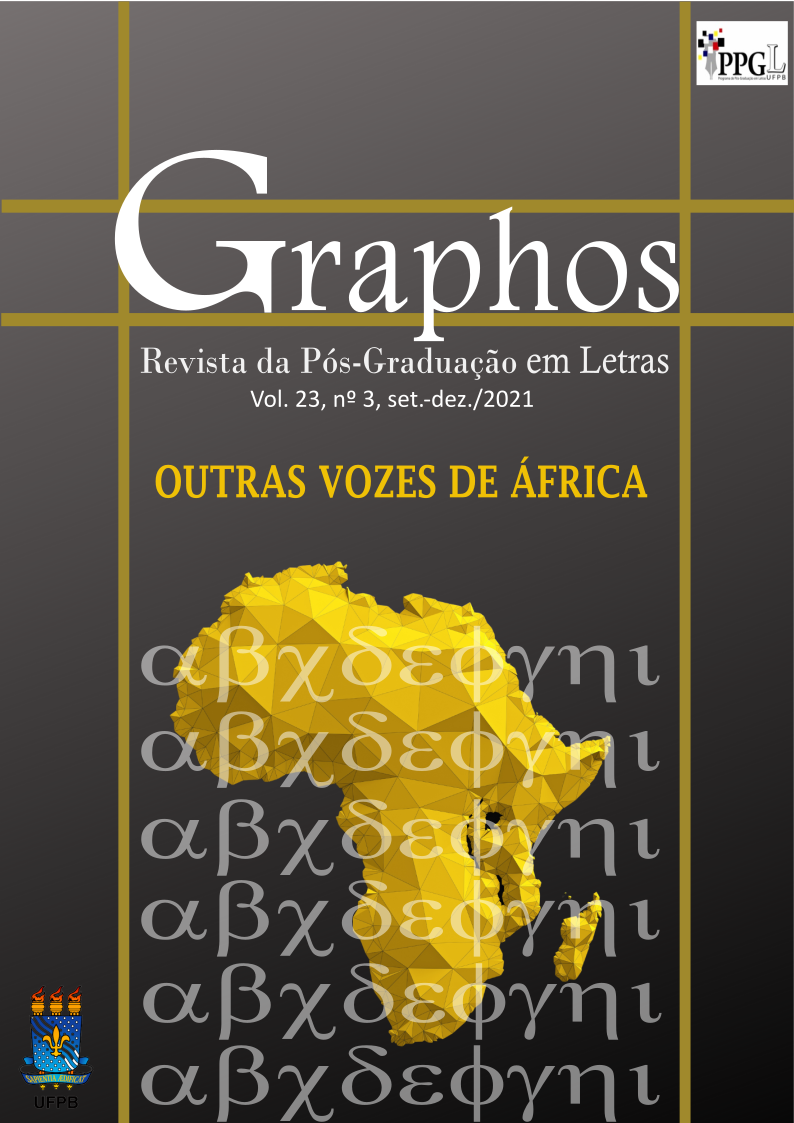“When many people together do one small thing …”: a reading of Wangari Maathai’s Unbowed: one woman’s story
DOI :
https://doi.org/10.22478/ufpb.1516-1536.2021v23n3.59492Mots-clés :
AFRICA, DEVELOPMENT, KENYA, LEADERSHIP, LITERATURERésumé
Wangari Maathai foi uma cientista modesta e uma ativista, cuja paixão, ao longo de sua vida, pelo plantio de árvores, conservação do meio ambiente e uma distribuição equitativa de recursos acabou lhe rendendo o Prêmio Nobel da Paz. A vida da Prof.ª Wangari Maathai, como representada no seu memorial Unbowed: One Woman’s Story oferece uma visão positiva da mudança. A leitura de Unbowed desvenda a sua filosofia de desenvolvimento como um processo de melhoria dos padrões de vida da uma comunidade, trabalhando desde a base e empoderando os indivíduos a usar, da melhor forma possível, o que está disponível a eles. O ponto inicial da leitura é a sua compreensão de ecologia. Nós, então, investigamos como a proteção do meio ambiente afeta o progresso econômico e social. A presente leitura também discute a importância das relações de gênero e a questão de como lidamos com o passado colonial do Quênia hoje. Enquanto a obra Unbowed pode aumentar a conscientização sobre as implicações de gênero na linguagem e no estilo, ela põe em primeiro plano a aceitação e o progresso e urge que pessoas deem o melhor de si para o bem comum. O livro de memórias inspira os jovens que desejam uma educação, as mulheres que desejam liberdade e realização, e líderes de integridade em todos os lugares. Ler o memorial planta uma semente de grande importância para o desenvolvimento por meio de uma liderança transformadora e de justiça social.
Téléchargements
Références
AKUMU, P. Women rights violations don’t need to kill or maim to still be violations. African Arguments, 2015. Available at: https://africanarguments.org/2015/09/22/womens-rights-violations-dont-need-to-kill-or-maim-to-still-be-violations/. Access on: 23 Jul. 2021.
ALCORN, J. B. Ethnobotanical knowledge systems – a resource for meeting rural development goals. In: WARREN, D. M.; SLIKKERVEER, L. J.; BROKENSHA, D. W. (ed.). The Cultural Dimension of Development: Indigenous knowledge systems. London: Intermediate Technology Publications, 1999. p. 1-12. DOI: https://doi.org/10.3362/9781780444734.001
DELAP, K. Q. From root to tree: Wangari Maathai's Green Belt Movement — the grassroots approach to addressing human rights violations. Environmental Claims Journal, v. 25, n.2, p. 144-153, 2006. DOI: https://doi.org/10.1080/10406026.2013.782251
DESAI, V.; POTTER, R. B. (ed.). The Companion to Development Studies. 2.ed. London: Hodder Education, 2008.
EAGLETON, M. (ed.). Feminist Literary Criticism. London: Longman Group UK, 1991.
ESTOK, S. C. Ecocriticism and Shakespeare: Reading Ecophobia. New York: Palgrave Macmillan, 2011. DOI: https://doi.org/10.1057/9780230118744
FLITTNER, B. Review of Unbowed. Good reads, 2006. Available at: https://www. goodreads.com/book/show/201111.Unbowed?ac=1&from_search=true&qid=BEUhemoQ2c&rank=1. Access on: 23 Jul. 2021.
GRANESS, A. Ecofeminism in Africa: the contribution of Wangari Maathai. In: CHIMAKONAM, J. O.; TOIT, L. Du (ed.). African Philosophy and the Epistemic Marginalization of Women. New York: Routledge African Studies, 2018. p.189-206. DOI: https://doi.org/10.4324/9781351120104-13
HODDER, R. Development Geography. London: Routledge, 2000.
KENYATTA, J. Facing Mount Kenya. Nairobi: Kenway Publications, [1938]1992.
KRISTA the krazy kataloguer. Review of Unbowed. Good reads, 2007. Available at: https://www.goodreads.com/review/show/8706469. Access on: 23 Jul. 2021.
MAATHAI, W. Unbowed: One Woman’s Story. London: Arrow Books, 2007.
MCALPINE, C. Review of Unbowed. Good reads, 2006. Available at: https://www. goodreads.com/book/show/201111.Unbowed?ac=1&from_search=true&qid=BEUhemoQ2c&rank=1. Access on: 23 Jul. 2021.
MBITHI, E. K. Multilingualism, Language Policy and Creative Writing in Kenya. Multilingual Education, v. 4, n. 19, p. 1-9, 2014. Available at: http://www.multilingual-education.com/content/4/1/19. Access on: 23 Jul. 2021. DOI: https://doi.org/10.1186/s13616-014-0019-9
NANKANI, G. Foreword. In: CHIMAKONAM, J. O.; TOIT, L. Du (ed.). Power, Rights, and Poverty: Concepts and Connections. Washington, DC: The International Bank for Reconstruction and Development/The World Bank, 2005.
NGUGI WA THIONG’O. Decolonising the Mind. London: James Currey, [1981]2004.
NYABOLA, N. Wangari Maathai was not a good Woman. Kenya needs more of them. African Arguments, 2015. Available at: https://africanarguments.org/2015/10/06/wangari-maathai-was-not-a-good-woman-kenya-needs-many-more-of-them/. Access on: 23 Jul. 2021.
RAMANATHAN, S. 2006. A Review of Wangari Maathai’s Autobiography Unbowed. Grist, 2006. Available at: https://grist.org/article/ramanathan/. Access on: 23 Jul. 2021.
ROTHSCHILD, M. (ed.) Reading Women’s Lives. Boston: Pearson Custom Publishing, 2005.
SACHS, W. The Development Dictionary: A guide to Knowledge as Power. London: Zed Books, 1995.
SANDBROOK, R.; MCDOWELL, D. Foreword. In: PRESCOTT-ALLEN, R.; CAREW-REID, J.; BASS, S.; DALAL-CLAYTON, B. (ed.). Strategies for National Sustainable Development: A Handbook for their Planning and Implementation. Gland: Earthscan Publications, 1994.
SERAGELDIN, I.; STEER, A. (ed.) Valuing the Environment: Proceedings of the First Annual International Conference on Environmentally Sustainable Development. Washington, DC: The International Bank for Reconstruction and Development/The World Bank, 1995. DOI: https://doi.org/10.1596/0-8213-3549-9
STAUDT, K. Gender, population and development. In: DESAI, V.; POTTER, R. B. (ed.). The Companion to Development Studies. 2.ed.. London: Hodder Education, 2008.
TAL, A. (ed.). Speaking of Earth: Environmental Speeches that Moved the World. New Brunswick, NJ: Rutgers University Press, 2006.
THE Nobel Peace Prize 2004. The Nobel Peace Prize, 2004. Available at: https://www. nobelprize.org/prizes/peace/2004/summary. Access on: 23 Jul. 2021.
TUTTLE, L. Encyclopedia of Feminism. New York: Longman, 1986.
WORLD BANK. Global Monitoring Report 2012: Food Prices, Nutrition, and the Millennium Development Goals, 2012. Available at: https://www.imf.org/external/pubs/ft/ gmr/2012/eng/gmr.pdf. Access on: 23 Jul. 2021.
Téléchargements
Publiée
Numéro
Rubrique
Licence
(c) Tous droits réservés Esther Mbithi 2021

Ce travail est disponible sous la licence Creative Commons Attribution 4.0 International .







